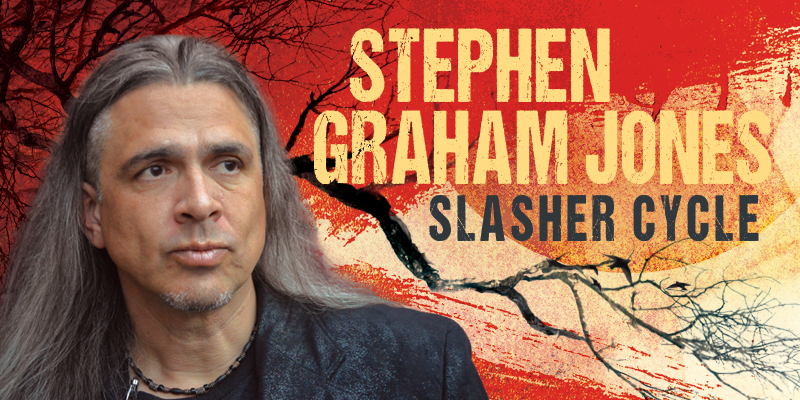Stephen Graham Jones: Slasher Cycle

Stephen Graham Jones, a member of the Blackfeet Tribe, was born in 1972 in Midland TX, and grew up in Texas apart, from a year in Colorado when he was a teenager. He attended Texas Tech University, studying English and philosophy, and attained a master’s degree at the University of North Texas. He earned his PhD in creative writing at Florida State University. Jones taught at Texas Tech before accepting a position at University of Colorado at Boulder, where he has been a professor for the past 13 years. He also teaches most summers in the low-residency program at the Palm Desert Center of the University of California Riverside.
Jones is an acclaimed short fiction writer who began publishing work of genre interest in 2005. He excels at novella length, with many works published as standalones, including Shirley Jackson finalist The Long Trial of Nolan Dugatti (2008), The Elvis Room (2014), Chapter Six (2014), Stoker Award winner and World Fantasy and Shirley Jackson Award finalist Mapping the Interior (2017), Stoker Award winner Night of the Mannequins (2020), Attack of the 50 Foot Indian (2020), and Wait for Night (2020). Novelette “Lonegan’s Luck” (2008) was a Shirley Jackson Award nominee and “The Night Cyclist” (2016) was a Stoker Award finalist. Some of his short fiction has also been collected in Stoker and Shirley Jackson Award nominee The Ones That Got Away (2010), Three Miles Past (2013), Zombie Sharks with Metal Teeth (2013), Stoker and Shirley Jackson Award finalist After the People Lights Have Gone Off (2014), and The Faster Redder Road: The Best UnAmerican Stories of Stephen Graham Jones (2015).
Most of his books are literary horror. Debut novel The Fast Red Road: A Plainsong appeared in 2000. Other books include All the Beautiful Sinners (2003), Demon Theory (2006), Ledfeather (2008), It Came from Del Rio (2010), Zombie Bake-Off (2012), The Last Final Girl (2012), The Least of My Scars (2013), The Gospel of Z (2014), Stoker and Shirley Jackson Award finalist Mongrels (2016), and Bradbury and Stoker Award winner The Only Good Indians (2020). He collaborated with Paul Tremblay (under pen name P.T. Jones) on Floating Boy and the Girl Who Couldn’t Fly (2014).
New novel My Heart Is a Chainsaw is forthcoming in August.
Excerpts from the interview:
“All I ever wanted to do was farm. Everybody where I grew up either farmed or worked in the oil fields, and everybody I knew that worked in the oil fields always came back missing fingers and all messed up. I thought farming must be the way to go because I wanted to keep my fingers. I never even had any inkling of writing. I always loved reading, and I knew I could tell stories and I could lie, but I just never imagined it as a job. The distance from where I was to creating a book or a story, there was no path between those two. I never even imagined. But I was always reading, coming up – always had a book stuffed in my pocket, or a comic book.
“I got kicked out of high school, but in what would have been my senior year, this girl I wanted to ask out had plans for her life, like going to college and stuff, and she had a test slot for the SATs, but she didn’t have a car. I had an old pickup truck and no plans, but I figured I could sign up for the SATs and ask her if she wanted a ride, and that would be my in. I would have, like, ten minutes with her and I could ask her out, and it worked. I went and took the SATs, and I did good on them, I guess just because I’ve always been a reader. It was just something stupid I did to ask a girl out. But then I got my diploma in a weird way – my mother took me out to eat and she gave me two things. One, she gave me a suitcase. She said, ‘Here’s a suitcase so you can get out of town,’ because she knew that if I didn’t get out of town then, I never would. She said, ‘You’ve always been reading your whole life, so I saved up and I’m going to pay for you to go to one semester of college.’ I said to her, ‘I can put off getting a tractor for a little bit,’ so I went for the fall to college. I figured it was just going to be four months to hang out in a different town. But I was sitting in a Reasoning classroom – because I had registered late, I had to take all the classes nobody else wanted, and a beginning philosophy course is what I ended up in – and for the first time in my life I was sitting in a room where people cared about what they read. They were talking about reading as if it mattered. I had never experienced anything like that, ever. All the classes I’d been, in coming up, no one would even read what they were supposed to read. They would just fake it. The teacher, like when we were doing Beowulf or something, she’d always call on me to read it aloud because I could always get all the intonations and the pronunciations correct. I would read the stuff, too, when I was in class. I wasn’t in class very often, but when I was in class I would read the stuff. But I got hooked. So I got loans and jobs and did another semester.
“In that second semester, I was sitting in the back of a big world lit classroom, 300 people in a big auditorium, and I was in back with a spiral notebook and a pen so I could take some notes on Canterbury Tales or whatever, and a couple of police officers come in. They took their shades off, and they were looking around, and I knew they were there for me, because my whole life, any time the cops come in the room, they’re always there for me. Sure enough, they see me, indicate that I should follow them. So I slide to the lobby with them, and it turns out they don’t want to call me in for anything I’ve done the last weekend. One of my uncles who was two hours away in my hometown had been burned over his whole body terribly, and they had airlifted him to where I was because we had the best burn unit in the region, and I was the only family member they could find. I sat there with my uncle for three days and three nights with just my spiral notebook and my pen, waiting for him to live or die… and I got bored. I read all the magazines in the waiting room, and didn’t have anything else to do, so I just sat down and wrote a story – my first story ever. When I came back to my Comp 2 classroom the next Monday after missing class on Friday, I hadn’t done the personal essay I was supposed to do, so I just ripped those pages out of my spiral notebook, that story, and gave it to my instructor. I said, ‘This proves I was writing, anyway.’ She took it, and she liked it enough that she typed it up and entered it into a departmental contest for me, and it won that contest and I got $150. That just opened the door for me – like, ‘You mean you can turn lies into money? I never knew you could do that.’ So I just kept doing it, kept doing it, and kept doing it.
“That first story that I wrote in the waiting room of the burn unit ICU was a ghost story – most of my stories from then are either farming stories or some type of paranormal. Well, crime too, I guess. A lot of killing. What I’m getting at – I was really influenced by the X-Files, starting out. That and Terminator 2, Louis L’Amour Westerns, and Conan the Barbarian were probably my four big influences back then, and still. They’re still part of the kernel that is who I am as a writer. I’ve always been into stuff that tests the limits, that pushes a little further than it’s supposed to, content-wise or form-wise, or both sometimes.
“And, yeah, of course I’m all into horror, graphic and intense or not. But, I’d say, the special province of horror on the page is dread. And you get at dread mostly with uncertainty and atmosphere, suggestion and foreshadowing. All that just ratchets the tension up higher and higher for the reader, such that they don’t know when something’s going to happen. Once you get the tension strung that tight, you can just snap it all at once, and the best way to do that is to overload the senses. You do that with a splashy gore scene or something.
“I do believe that reality is perception, yes. If I can lock the reader tightly enough into a character’s perception, then that perception becomes the reader’s reality… for as long as they’re reading. But they see it all through their own goggles, of course, their own experiences and life and whatever, and that’s the only way they can see it. People always talk about unreliable narrators and, to tell you the truth, I think that’s a redundant term. I think ‘narrator’ inheres unreliability, because even if we don’t mean to lie, we’re still selecting this event instead of that event to talk about, and that’s a form of omission. Anyone who narrates a story, or narrates anything, is always giving you their version, and their version always has a slant to it, to either make themselves the hero or try to disingenuously convince you that they’re not the hero, which is a way of establishing authority and heroicness around the side. There are so many tricks. Any time anybody ever says ‘I,’ then I know not to trust them.
“I do think that wherever we are now in life, where we’ve washed up is a result of our previous decisions. Every decision you make pushes you more this way than that way, and so, as a character, if you are mulling over and dwelling on your past decisions and things that have happened to you, then that’s rigging your world such that you can only go in one direction. I’m not necessarily fatalistic, because I do think you make your own choices, but your choices branch you into this reality and then the next reality, just finer and finer, and you can’t jump to another limb – you’re already on the limb you’re on of your life.”
Interview design by Francesca Myman. Photo by Stephen Graham Jones.
Read the full interview in the August 2021 issue of Locus.
 While you are here, please take a moment to support Locus with a one-time or recurring donation. We rely on reader donations to keep the magazine and site going, and would like to keep the site paywall free, but WE NEED YOUR FINANCIAL SUPPORT to continue quality coverage of the science fiction and fantasy field.
While you are here, please take a moment to support Locus with a one-time or recurring donation. We rely on reader donations to keep the magazine and site going, and would like to keep the site paywall free, but WE NEED YOUR FINANCIAL SUPPORT to continue quality coverage of the science fiction and fantasy field.
©Locus Magazine. Copyrighted material may not be republished without permission of LSFF.







